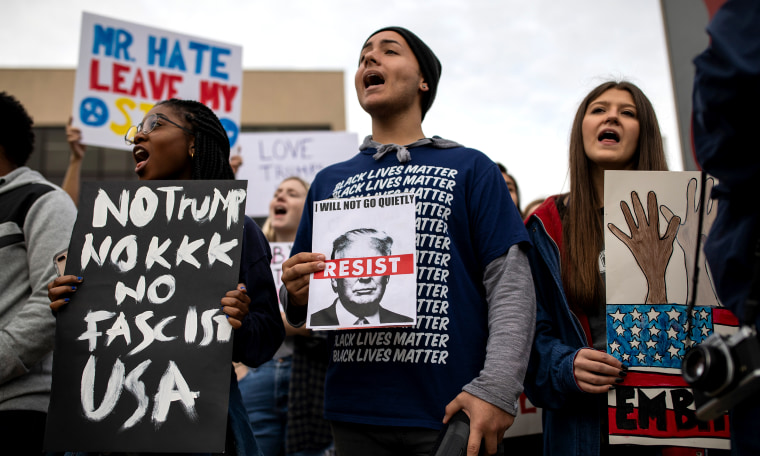The future of America loomed large over Donald J. Trump’s second impeachment trial. The two youngest voting generations were the most fervent in wanting to see the former president held accountable. So what happens to their belief in American democracy now that Trump clearly tried to overturn an election, even in the eyes of many Republicans, but was acquitted of his accused crime?
As we learn more about Americans’ response to the Jan. 6 riot and its aftermath, it is clear that Republican inaction reinforced generational political fault lines, and renewed questions about our democratic institutions that Democrats must now answer.
While a majority of Americans wanted to see Trump impeached and convicted, millennials and members of Generation Z were the driving force behind those numbers. An early February Morning Consult + Politico National Tracking Poll found that 64 percent of millennials and 59 percent of Gen Zers wanted to see Trump convicted. Those levels of support for conviction were higher than among their elders in Gen X (51 percent) and baby boomers (49 percent).
In advance of Trump’s second impeachment, younger voters were more focused on accountability for the former president than Republicans writ large. Pre-trial focus groups by HIT Strategies, a Democratic polling firm, found that while voters under 40 saw some Republican members of Congress as complicit in the attack, they ultimately blamed Trump for what had transpired.
But once the trial was over, those same focus groups’ indignation was no longer just directed at Trump himself — it was pointed toward the full GOP. According to HIT Strategies, young voters saw Republicans’ inaction as part of a throughline, “a precedent of zero accountability for the white and the wealthy.” Democrats, by contrast, received credit for fighting back. As a question of partisanship, from these preliminary insights, it seems as though the riot, the second impeachment trial and Republicans' refusal to hold Trump accountable only affirmed young Americans’ partisan perceptions.
Beyond partisanship, I wonder how Trump's skirting punishment yet again is informing their perception of American democracy.
“These are two lost generations for the Republican Party,” Morley Winograd, a generational expert and president and CEO of the Campaign for Free College Tuition, tells me. “Trump and anyone associated with him is going to be dismissed out of hand by the large majority of people under 45.”
But beyond partisanship, I wonder how Trump's skirting punishment yet again is informing their perception of American democracy. Each generation is affected by the public events that coincide with their coming of age. For older millennials like myself, the attacks of Sept. 11, 2001, and the subsequent wars in Iraq and Afghanistan shaped our generation’s understanding of America’s place on the world stage and curbed our appetite for unilateral international action. The 2008 recession, coupled with the Occupy Wall Street and Black Lives Matter movements, further defined our political identities.
Throughout the Trump presidency I’ve wondered how the younger members of my own generation and the infinitely impressive, side-part and skinny-jean-hating generation that follows us were shaped by the Trump years. How will the movement for racial equality, the existential threat of climate change, the mishandling of a global pandemic and now a president twice impeached shape the way they see the world and their place in it?
That will be answered in part by what Republicans have chosen not to do, and in part by what Democrats are able to deliver. Young Americans have “totally given up on Republicans,” Charlotte Alter, author of "The Ones We’ve Been Waiting For: How a New Generation of Leaders Will Transform America" tells me. “Now the question is, can Biden and Democrats in the Senate get things passed that this generation actually wants?”
Among the policies that are top of mind for these young voters: student debt, immigration reform, voting rights and questions of gender and racial equity. A little over a month into the Biden administration, the debates around some of those issues are taking shape. Democrats are talking not about if student debt should be cancelled, but debating how much debt should be forgiven per borrower. They have introduced an immigration reform bill and simultaneously signaled a willingness to pursue a piecemeal approach to the issue. All of this is playing out at the federal level at the same time that state-level Republicans are advancing voter suppression efforts.
Among the policies that are top of mind for these young voters: student debt, immigration reform, voting rights and questions of gender and racial equity. A little over a month into the Biden administration, the debates around some of those issues are taking shape.
On this last point, Terrance Woodbury, the Democratic pollster behind HIT Strategies, encourages Democratic lawmakers to ring the alarm on Republican efforts to limit voting access. “It’s compromising democracy. It’s dirty politics. It’s the type of thing that young people will consider disqualifying,” Woodbury says. “Name it. Name it racism. Then take proactive legislative steps to correct it.” Among those steps: passing the John Lewis Voting Rights Restoration Act.
Democrats have an opportunity to cement the support of the United States’ two largest generations. The political stakes are high, and so too are the stakes for our democracy. As much as GenZ and millennials are assessing Democrats as a political party, they are looking to them to prove that our government can make good on real change. They are looking to them to affirm their faith in America.

